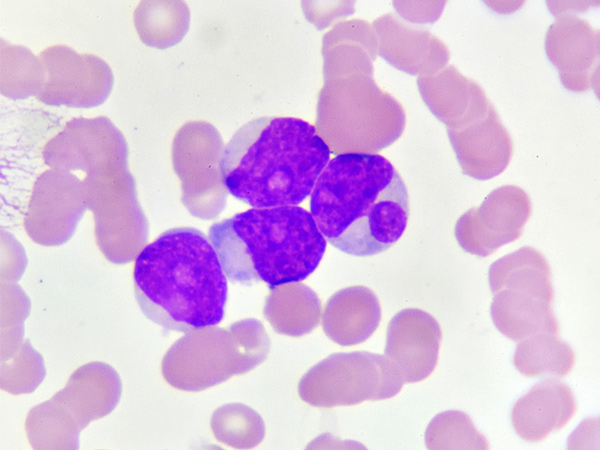New Targeted Therapy for Acute Myeloid Leukemia
A second inhibitor of mutant IDH1 was approved to treat certain blood cancers.
The U.S. Food and Drug Administration (FDA) has approved olutasidenib (Rezlidhia) for patients with relapsed or refractory acute myeloid leukemia (AML) containing a mutation in IDH1. Olutasidenib is the second IDH1 inhibitor to be approved to treat AML, following the 2019 approval of ivosidenib.
A companion test, the Abbott RealTime IDH1 Assay, was also approved to select patients eligible for olutasidenib.

IDH1 is a metabolic protein that is mutated in approximately 20 percent of AML cases. When mutated, IDH1 drives cancer formation by interfering with cellular maturation and promoting uncontrolled cell proliferation. Olutasidenib is an orally delivered drug that selectively binds and inhibits mutant IDH1, thereby inducing cellular maturation and suppressing cell proliferation.
The approval is based on results from Study 2102-HEM-101, an open-label single-arm, multicenter phase I/II clinical trial that enrolled 147 adult patients with relapsed or refractory AML harboring an IDH1 mutation, as confirmed by the Abbott RealTime IDH1 assay.
Thirty-five percent of patients treated with olutasidenib experienced a complete remission with or without partial hematologic recovery. The median duration of complete remission was 25.9 months.
Of the 86 patients who were dependent on red blood cell and/or platelet transfusions prior to olutasidenib treatment, 29 (34 percent) became transfusion-independent. The majority (64 percent) of patients who were transfusion-independent before olutasidenib remained as such.
The approval is accompanied by a boxed warning highlighting the risk of potentially fatal differentiation syndrome.
AML is a cancer of the blood and bone marrow. In 2022, it was estimated that there would be 20,050 new cases of AML in the U.S., and 11,540 deaths.
The FDA rendered its decision on December 1, 2022.
